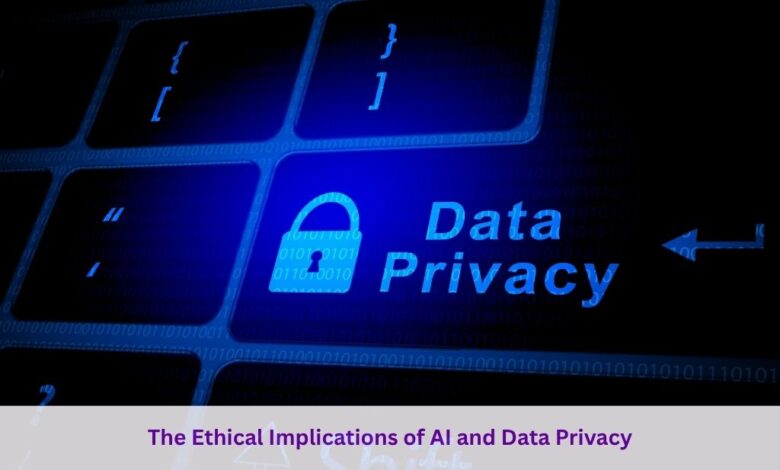The Ethical Implications of AI and Data Privacy

From tailored recommendations on streaming platforms to autonomous cars and sophisticated medical diagnostics, artificial intelligence (AI) has changed the way societies run. Although the advantages are clear-cut, the development of artificial intelligence raises serious ethical issues especially regarding data privacy. One of the most hotly contested subjects in technology, law, and public policy now is the ethical ramifications of using and maybe abusing AI-driven data collecting, surveillance, and profiling. Examining how artificial intelligence interacts with basic human rights and how ethical frameworks might help direct its evolution and application becomes increasingly important as AI develops.
Knowing Data Collection and AI
AI systems make decisions and learn mostly from data. Particularly machine learning models need large databases to find trends, increase accuracy, and change with new inputs. These databases sometimes feature personal information ranging from browsing history and purchase behavior to health records and biometric data. Consent, openness, and responsibility are seriously questioned by the simplicity with which private companies and public institutions may gather, evaluate, and apply this data.
The growing reliance on artificial intelligence has driven a necessary rethink of conventional ideas of privacy. Many times, people have no idea how their data is gathered or applied. They might not be aware of the kind of conclusions artificial intelligence systems draw about them or how those conclusions impact credit, employment, or access to services decisions.
Ethical Issues with Data Privacy and Artificial Intelligence
1. Openness and informed permission
Informed consent is one of the fundamental ideas behind moral data use. In the context of artificial intelligence, though, getting actual informed consent is difficult. Most users do not know exactly what data is being gathered or how it will be applied. The average person finds it difficult to make wise decisions from privacy policies since they are sometimes thick, complicated, and full of legal jargon. Transparency should be given top priority in ethical artificial intelligence since it guarantees that users have actual options about their data and that data collecting methods are precisely explained
2. Controlling and Owning Data
In the digital era, whose ownership of personal data? Often stored, handled, and sold by companies, users create the data. Ethical models advocate for people to own and control their information. This covers access, correct, delete, and porting of their data as necessary. Lack of control compromises not only autonomy but also provides a path for manipulation and exploitation.
3. Monitoring and Autonomy
From predictive policing to facial recognition, governments and businesses are using artificial intelligence for surveillance increasingly. Although efficiency and security justify these technologies most of the time, they seriously compromise personal liberties and rights. Constant monitoring might result in self-censorship, chilling consequences on free expression, and persecution of underprivileged groups. Respect for autonomy is an ethical tenet that says people shouldn’t be under continual surveillance without cause.
4. Discrimination and Biases
AI systems are just as objective as the data they are trained on. Should training data show historical prejudices or social inequalities, the artificial intelligence will probably replicate and even magnify such prejudices? Justice and fairness suffer greatly from this as well. Biased algorithms have, for example, produced discriminating results in lending, law enforcement, and hiring. Designed and tested with justice in mind, ethical artificial intelligence guarantees that decisions do not unfairly disadvantage any group.
5. Administration and Responsibility
Who is mindful when fake insights frameworks blunders or incur harm? Engineers, information sources, and conclusion clients in some cases share a diffused obligation. Building up clear duty frameworks is portion of moral administration to ensure that substances utilizing manufactured insights reply for their impacts. This covers setting up criteria for ethical plan, doing visit reviews, and building channels of correction.
The Administrative Landscape
By implies of laws and administrative frameworks, governments all around are beginning to handle the moral essences of fake insights and information protection. One of the foremost exhaustive endeavors to supply shoppers more control over their individual information comes from the Common Information Assurance Control (GDPR) of the European Union. Among other rights it requires openness, information minimizing, and the proper to be forgotten.
With sector-specific laws just like the California Customer Security Act (CCPA) and the Wellbeing Protections Compactness and Responsibility Act (HIPAA), American control is more scattered. In spite of the fact that countries are at diverse stages of creating AI administration frameworks all inclusive, facilitated worldwide exertion is still lacking.
Ethical issues rise above simple lawful recognition as well. Businesses are encouraged to set inner survey sheets to oversee counterfeit insights activities and take after ethical benchmarks. Pointing at supporting moral AI advancement, industry bodies and non-profit organizations have discharged a range of thoughts and best practices.
Finding Adjust: Protection vs. Innovation
A principal moral problem is how to adjust security with advancement. Data-driven manufactured insights presents, on one hand, awesome focal points for making strides client encounters, coordination’s, and healthcare as well as for unchecked information collecting and algorithmic decision-making, on the other hand, can dissolve believe, abuse rights, and worsen social imbalance. Improvement of moral counterfeit insights implies purposefulness trade-offs. Whereas still permitting machine learning, techniques including differential protection, combined learning, and information anonym zing offer assistance protect client security. Besides, counting a few partners within the plan and execution of manufactured insights frameworks ensures that moral issues are not as it were given best need but or maybe an essential component of the method of development.
Real-world Case Thinks about and Examples
Examining genuine occasions where these issues have risen makes a difference one to superior get a handle on the ethical consequences of fake insights and information security. The Cambridge Expository embarrassment, for occasion, uncovered how millions of Facebook users’ individual data was assembled without consent and after that utilized to shape political comes about. This case made clear how direly more capable corporate information hones and harder rules are needed.
Another well-known illustration is facial acknowledgment innovation connected by law authorization offices. Some of the time these frameworks have been appeared to misidentify individuals particularly individuals of color which comes about in incorrect captures and infringement of respectful rights. Such comes about appear the require of guaranteeing algorithmic reasonableness as well as the conceivable comes about of utilizing fake insights without sufficient control.
Also advertising a striking case think about is healthcare. Since the preparing information connected healthcare costs instead of genuine require with quality of care, AI apparatuses utilized to figure understanding chance levels have once in a while been found to reflect racial biases. This appears how, missing cautious plan and approval, indeed well-intentioned counterfeit insights applications can back orderly inequality.
Views all inclusive on Morals and Privacy
Various countries have reacted in an unexpected way to the moral and security concerns raised by fake insights. Whereas the EU has driven the charge with solid protection rules, other nations like China have pushed manufactured insights advancement with less confinements, so focusing state reconnaissance capacities. Japan, Australia, and Canada have in the interim begun ventures to make AI frameworks pushing openness, obligation, and human rights.
This contrast emphasizes the require of around the world communication and participation. Not one or the other do the moral results of its use nor does manufactured intelligence technology regard boundaries. Like in atomic arms or climate alter, creating around the world guidelines seem help to construct a more reasonable and secure computerized environment. Imperative to begin with steps in this direction are multinational proposals on fake insights ethics by UNESCO and the OECD Standards on AI.
Ethical AI by Plan: Societal Responsibility
Developing ethical counterfeit insights could be a social obligation not fair of designers or lawmakers. AI’s course is molded in portion by gracious society organizations, scholastics, and the common open as well as by trade. Basic to begin with steps toward law based cooperation in counterfeit insights improvement are instructing customers almost their rights, outfitting them to challenge information hones, and encouraging communication around moral innovation. Planning moral AI begins at conception instead of as a post-deployment settle. Counting morals into building instruction, empowering multidisciplinary participation, and using ethics-by-design approaches will offer assistance to ensure that counterfeit intelligence tools reflect human-centric values. Engineers got to thrust themselves to think through how their works could be abused and act in like manner in preventative sense. Additionally, building different and comprehensive advancement groups will help to altogether lower moral daze spots. More assorted focuses of see empower one to spot biases, foresee manhandle circumstances, and plan advances more suited for several circles of life. AI expecting with sympathy and social mindfulness is more likely to be fair, respectful, and efficient.
In brief, Information security and fake insights have complicated moral repercussions that expand broadly. Setting up moral guidelines that provide human nobility, equity, and duty best need is essential as artificial insights keeps attacking all circles of life. Policymakers, technologists, ethicists, and respectful society all have a part in this diverse approach required. Enactment can offer a premise, but moral manufactured insights too has to be motivated by a society of responsibility and a commitment to secure individual freedoms. At that point society can completely maximize counterfeit intelligence’s conceivable outcomes whereas diminishing its risks.
Our shared duty as we arrange the advanced age is to create beyond any doubt that human rights are not yielded in arrange to progress innovation. In spite of the fact that it may not always be straightforward to strike, the concordance between morals and development is significant for building a future in which fake insights regards protection, makes a difference to construct certainty within the frameworks we depend on, and serves mankind.




